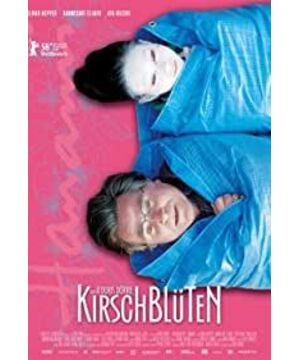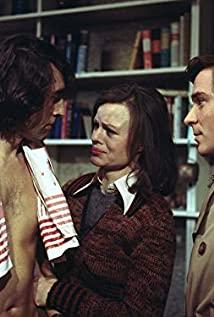quiet and beautiful town, my husband who sticks to the rules does the same thing every day, walking on 7:28 The morning sun goes to work, and then comes back with the sunset, or walks through rows of small houses with white walls, or takes off his coat and puts on slippers with the help of his wife... The peaceful and sweet scenery of the small village is like a slideshow It flashed like a film, and I listened attentively, only the sound of wind and birdsong, or the quack of wild ducks mixed with it, so natural and quiet, it was almost forgotten that there were other people, and they only saw each other. .
Here, the director shows the audience the extremely trivial and ordinary lives of the two old people. They do not deliberately pursue aesthetics. They can even hear the roar of trains and the buzzing of flies. However, it is this kind of ordinary life. And trivial, after the death of his wife, he was reminded again and again by his husband. When the family gathered around the table to eat, and the happy talk seemed to gradually forget about the mother's departure, there was a buzzing fly on the white tablecloth; Everyone is immersed in the luxury given by the bustling Tokyo, but the husband said to his son with a lonely expression: There are no flies here. The humming noise became more of a symbol for him, containing too many memories of the two of them living together, but it gradually diminished after the death of his wife and could never be regained.
After the wife learned that her husband was terminally ill, she persuaded him to go with her to see the children. Under the warm sunshine, the wife still wore her white woolen hat and the warm lake blue sweater. The couple carried their luggage and walked through the shadow shaded by the white hut, embarking on their final journey.
Life in the city is noisy and crowded, and the relationship between the elderly and their children is constantly in conflict. The only thing that makes people feel warm is the "Mayfly" that was recited by everyone at the family dinner: Oh, let it be born, let it be dance until the twilight drums. This poem also appeared again on the postcard sent by the wife to Tokyo that the husband found. The old man burst into tears after reading it. It not only represented the memory of the past, but also gradually merged with the image of the wife, as if telling the wife. Life: That beautiful woman pursued dance all her life, but was bound by family and love, giving up again and again, until her life came to an end in the dance of death, she was free, even if it was short, she would Be a mayfly and dance freely in his only life...
When the husband who lost his wife returns to the original town alone, the scene at the beginning reappears, but this time only he is alone. It was still the white hut and the peaceful and peaceful countryside scenery, but this time there was a figure other than the husband and wife. When the husband returned home and put down his luggage, he habitually waited for his wife to help him take off his coat and wait. For a long time, there was only an empty back. This contrast further deepened the loneliness and sadness in the audience's heart, as if the connection between the two had been completely broken, leaving only the husband to survive alone.
The husband, who can no longer bear the loneliness and guilt, decides to take his wife's relics to Japan to find and fulfill his long-cherished wish.
On the bustling and bustling streets of Tokyo, the husband ties his wife's ironed handkerchief to the roadside guardrail to leave his wife's footprint. However, in this metropolis, what he encounters is extravagant and absurd life. The guilt makes the old man cry again. He takes off his wife's handkerchief and holds it tightly in his hand...
The twinkling Tokyo night scene suddenly changes and comes into view. It is the pink cherry blossoms in the soft sky. At this time, the background was again mixed with trivial human voices, the sound of water, and the quack of ducks, like an omen, heralding a different reunion between the husband and wife. When the camera moved with the pink telephone line hanging from the cherry tree, what the audience saw was a Japanese girl with weird makeup, dancing to a quaint Japanese folk song without anyone else... The
girl told the old man that the dead dance with the living, this sentence The words make a good foreshadowing and interpretation for the ending.
In the noisy background, the girl taught the old man to dance with soft movements and language. He imitated the girl and gently opened his arms to embrace the nature and the breeze. The director of this episode is not only an encounter between the old man and the young girl, but also a representative There is a turning point: since then, the husband began to gradually integrate into his wife's dream; since then, he is no longer just sad because of sadness, he has gradually learned to truly understand the deep spiritual world of his wife in the rest of his life.
The old man gave the cabbage rolls he made to the girl, and the girl put the remaining two cabbages and rice rolls together, and imitated their images and wrapped the bodies of the two with blue canvas, like her husband and wife. At the end of the film, the girl pointed to the two side-by-side spring rolls in the picture book and said to the old man's son, he must be very happy now, this implication renders a fairy tale for the ending The color like this makes the audience indulge in the happy fantasy created by the director, follow the old man to stay away from the mundane and mortal world, and enter the peach blossom garden of the soul...
Finally, the old man decided to go to Mount Fuji with the girl to see the holy place in his wife's heart.
The two waited for many days on the cloudy Mount Fuji. The old man could not bear the cold weather and fell ill in the hotel, indicating that his life would come to an end.
In the morning when the old man woke up, the sky was exceptionally blue, and the shy Mount Fuji finally revealed his beautiful figure. Her husband, the emperor's exaggerated heavy makeup, wearing his wife's pink kimono, came to the lake near the mountain. The sound of water and wind sounded quietly, and the theme music sounded again at this time. The old man danced affectionately with a natural symphony, tears slowly flowing from the corners of his eyes.
A hand moves down slowly with the camera, and the wife's hand appears in the first frame, and the two hands are finally intertwined again. By the clear lake, the husband and wife are embracing and dancing. The close-up of the face shows the corners of their mouths. There is a smile looming.
This group of beautiful shots has no language. It is composed entirely of the theme music and the actions of the two in a natural background, but it is worth more than a thousand words, pushing the emotion of the film to a climax, and a twilight romance slowly emerges. The feeling...
Mount Fuji, the old man in a kimono fell by the lake, really responded to the phrase "beat the twilight drum", in the sound of the twilight drum, it is not only the wife's ideal and freedom that has been fulfilled, is it also the husband's? What about the deep affection that transcends life and the world...
All in all, it's a really good film, the details are very delicate, there are a lot of front and back contrast echoes, like the humming of a fly's wings, like a checkered handkerchief, like before and after the death of my wife The husband's life is like the "Mayfly" recited by the wife, and like two vegetable rolls next to each other, these scenes or objects are endowed with certain symbolic meanings, and when different scenes are repeated, they give people different feelings. Secondly, the director has a lot of blanks in the processing of the lines, and these blanks have not eliminated the background noise, making each picture closer to reality. In the long blank and waiting, the audience will gradually integrate into the character's emotions, slowly To savor and understand this otherworldly love.
View more about Kirschblüten - Hanami reviews










